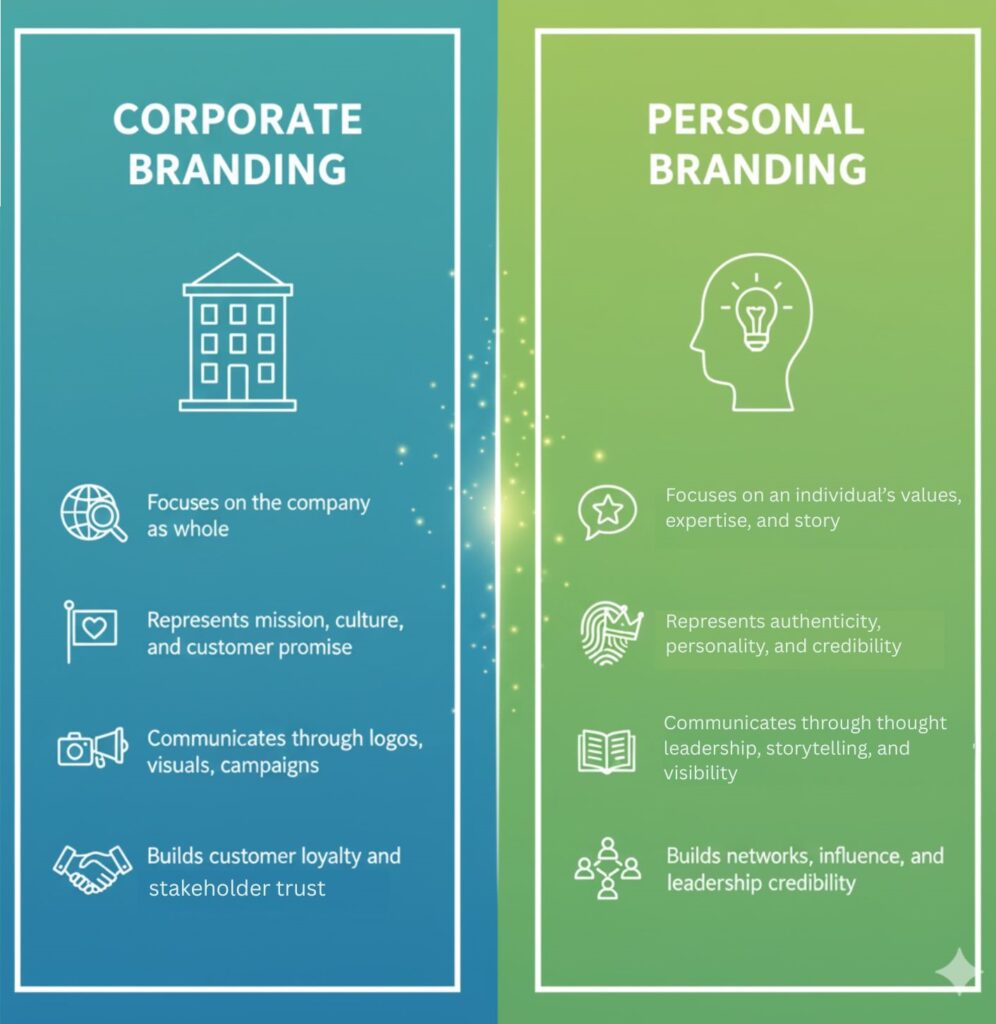
Now buyers no longer just look at logos or polished taglines when making decisions.
They look at people.
Studies show that nearly 70% of B2B purchase decisions will be influenced more by the credibility of individuals than by corporate advertising alone. This marks a powerful shift: the spotlight is moving from the company to the leader, from the brand name to the personal face behind it.
A personal brand is essentially the trust, authority, and values people associate with you as an individual. On the other hand, a corporate brand reflects the identity, mission, and promise of a business as a whole. The real question many founders, CEOs, and professionals are asking is: Can a strong personal brand outshine the corporate one? And more importantly, how do they work together without conflict?
This shift is not just theoretical, it’s already reshaping how leaders engage with their audiences.
Think about it: when Elon Musk tweets, Tesla’s stock moves.
When Richard Branson shares a new story, Virgin feels more alive. Their personal credibility has become inseparable from their company’s success.
That’s why for modern leaders, building a personal brand isn’t just about polished LinkedIn photos or catchy bios. It’s about creating a bridge between your personal authority and your company’s vision, a bridge that can attract opportunities, build trust faster, and drive growth in ways corporate messaging alone cannot.
Corporate Branding vs. Personal Branding
Corporate branding is the sum of everything a company communicates: its mission, values, visual identity, product quality, customer experience, and reputation in the market.

Think Nike: its swoosh logo, “Just Do It” slogan, and commitment to empowering athletes have made it one of the world’s most recognizable brands. But corporate branding doesn’t stop at marketing campaigns. It includes customer trust, in fact, 81% of consumers say trust is a deciding factor in their buying decisions (Edelman Trust Barometer, 2023).
While Personal branding is the strategic act of shaping how individuals, leaders, employees, or entrepreneurs, are perceived. It’s about communicating expertise, values, and authenticity in a way that builds trust and visibility.
Take Richard Branson. His adventurous, risk-taking personality is tightly woven into Virgin’s brand DNA. Customers associate Virgin with innovation, disruption, and fun, largely because Branson’s personal brand amplifies those traits.
Personal branding matters not just for CEOs or influencers, but for professionals at every level. A LinkedIn survey revealed that 79% of recruiters believe personal branding is essential when evaluating candidates. In other words, if you don’t define your personal brand, others will define it for you.
Why They Need Each Other
1. Trust Is Human
According to Edelman’s Trust Barometer, 68% of people expect CEOs to speak publicly on societal issues. Corporate messaging alone often feels too polished. People want to hear from leaders who show vulnerability, passion, and conviction.
Example: Microsoft under Satya Nadella. While the corporate brand highlights innovation and enterprise solutions, Nadella’s personal storytelling around empathy and growth mindset humanized the brand, reshaping Microsoft’s culture and restoring trust.
2. Personal Brands Amplify Corporate Visibility
When employees and leaders share content online, it generates far more engagement than company accounts. LinkedIn data shows that content shared by employees receives 2x more engagement than company posts.
Example: Elon Musk & Tesla. Love him or not, Musk’s personal tweets and bold statements keep Tesla in constant public conversation, often more than official Tesla press releases. His personal brand is the loudspeaker for Tesla’s corporate image.
3. Corporate Brands Protect Personal Brands
The synergy works both ways. While personal branding boosts visibility, corporate branding provides credibility and structure. A personal brand without a strong corporate brand can feel hollow.
Example: Apple & Steve Jobs. Jobs’ charisma, vision, and personal brand drew millions of followers, but it was Apple’s consistent corporate identity, innovation, design excellence, and user experience, that made his words believable. Without Apple’s brand promise, Jobs could have been dismissed as just another visionary.
4. Together, They Build Employer Branding
Today’s job seekers want more than salaries; they want alignment with values. Research shows that 86% of employees wouldn’t work for a company with a bad reputation (Glassdoor). When leaders showcase personal authenticity and the corporate brand reinforces those values, it creates a magnetic employer brand.
Example: Unilever combines its sustainability-driven corporate brand with leaders who openly champion climate action. This mix attracts top talent who want to work for a company (and leaders) aligned with their values.
The Future: Sustainability as the Bridge
Here’s where Green Brander’s vision becomes unique: sustainability. In 2025 and beyond, brands can’t afford to ignore environmental and social responsibility. Both personal and corporate branding need to communicate values that resonate with conscious consumers.
- Leaders who talk about their personal commitment to sustainability build credibility.
- Companies that embed sustainability in their mission strengthen trust.
- Together, they create alignment that customers, investors, and employees can believe in.
Example: Patagonia. The corporate brand’s bold environmental stance is amplified by founder Yvon Chouinard’s authentic personal story of simplicity and activism. It’s a perfect case study of synergy between corporate and personal branding built on values.
Practical Tips for Aligning Personal and Corporate Branding
- Leaders must be visible. CEOs and executives should actively share insights, stories, and thought leadership.
- Align values across levels. Employees should feel empowered to share content that reflects both their personal brand and company culture.
- Leverage storytelling. Corporate campaigns should integrate human stories, customer success, employee journeys, leadership experiences.
- Prioritize sustainability. Both personal and corporate messaging should reflect authentic commitments to sustainability and social impact.
- Consistency matters. Ensure the tone, visuals, and messaging complement each other. Mismatched brands create confusion.
In today’s hyperconnected world, people don’t separate the logo from the leader or the company from the individual voices inside it. Personal branding and corporate branding are two sides of the same coin.
A strong corporate brand creates recognition. A strong personal brand creates trust. Together, they drive growth, attract opportunities, and build resilience in times of crisis.
In 2025, the most powerful brands won’t just be recognized by their logos, they’ll be remembered for the people behind them.
At Green Brander, we help professionals and companies craft this synergy, aligning personal voices with corporate identity while embedding sustainability as a unique differentiator. Because the future of branding isn’t corporate vs. personal, it’s corporate + personal.




